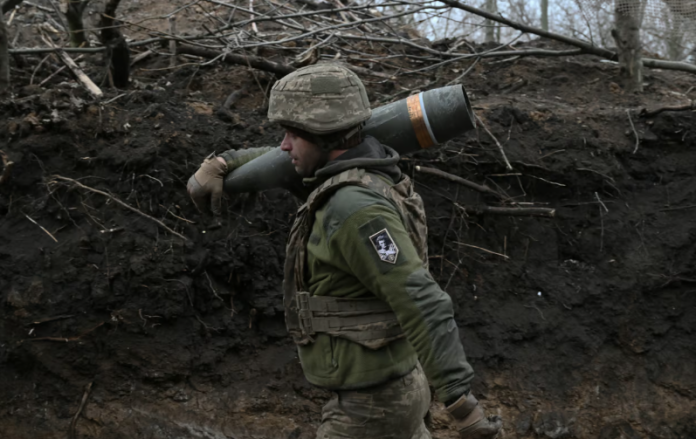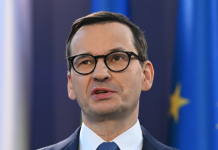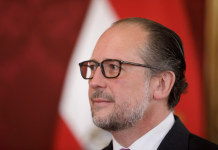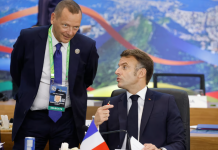The 57 countries forming a coalition that has pumped more than $122 billion in aid to Kyiv must continue no matter who sits in the White House, Ukrainian President Volodymyr Zelenskyy pleaded on Thursday.
“We’ve come such a long way that it would honestly be crazy to drop the ball now,” Zelenskyy said during the opening of the 25th meeting of the Ukraine Defense Contact Group, known informally as the Ramstein format because of the German air base where meetings are held.
The format has been crucial in giving Kyiv the weapons and financial aid needed to defend itself against Russia. After almost every meeting, allied countries trumpet gifts of cash, air defense systems, tanks, fighters, missiles, bombs, ammunition and more.
Thursday was no different, as the U.S., Germany and others announced new arms packages.
But the big question hanging over Ramstein is what happens when Donald Trump takes office on Jan. 20.
Trump has pledged to move swiftly to end the war, and earlier this week, to Kyiv’s dismay, he ruled out letting Ukraine join NATO. His supporters have also been skeptical of the cost of arming Ukraine and have — incorrectly— said that the U.S. is bearing much more of the burden than Europe.
For Kyiv, these are life-and-death issues.
Zelenskyy thanked U.S. Defense Secretary Lloyd Austin, who has chaired the meetings, for his leadership. He then warned participants that a new chapter is coming, where countries have to rely on each other and no country is too small to make a real impact.
“No matter what’s going on in the world, everyone wants to feel sure their country won’t just be erased off the map,” Zelenskyy said, calling for the continued functioning of smaller groups of allied countries working on issues like air defense and ammunition.
“The more determination we show in defending our interests — the more our partners, and especially the U.S., will see it’s good to stay on our side,” he added.
Kyiv is not sure Trump’s White House will be as supportive of the Ramstein format as Austin was. So far the new U.S. administration has not expressed interest in the Contact Group.
“That is a decision for next administration to make and I won’t speculate on which direction they will take,” Austin said. “This coalition is important not only to Ukraine, but to the U.S., to Europe to the entire world.”
The U.S. has broached the issue in informal talks with several European allies about who might play a larger role in the group come February if the Trump administration isn’t keen, said a NATO official, who was granted anonymity to discuss internal plans.
European officials first want to see where the new Pentagon chief stands on the group before making any moves.
Top EU diplomat Kaja Kallas said Thursday that the European Union would be ready to take the lead in supporting Ukraine if the United States was no longer willing.
“I’m really sure that all the other members, and hopefully also the United States, are ready to continue with the support to Ukraine,” Kallas said on her way to the Ramstein gathering. “The European Union is also ready to take over this leadership if the United States is not willing to,” she added.
“It’s difficult to predict what happens now,” said Guntram Wolff, an economist and senior fellow at the Brussels-based Bruegel think tank, adding the Ramstein meet “has been a useful format for coordinating military support to Ukraine.”
While some wanted to roll the platform into NATO, this is complicated because it includes many non-alliance members such as Japan.
“Of course, the anchor of the format has been the biggest military power,” said Wolff. “A lot depends on what the U.S. wants to make out of it now.”
As Kyiv braces for what happens under a Trump-led America, it’s hoping its defense coalitions with individual countries will become a substitute.
“We indeed have many defense coalitions here, such as the drone coalition, the artillery coalition, the air defense coalition, so the coalitions will remain,” a senior Ukrainian official familiar with negotiations told POLITICO on Thursday. “Whether the format will continue — we will see after the inauguration.”
Germany’s Defense Minister Boris Pistorius was clear he wants the talking shop to continue.
Allies “will continue to need a Ramstein format, I am firmly convinced of that,” he said at the air base. “The format is good as it is, it has proven itself and we want to stick with it.”
The last Ramstein?
Austin was the main driver of the Ramstein format. Thursday’s 25th meeting, which was postponed for four months because of Hurricane Milton, is his final one.
During the meeting, Austin announced a $500 million U.S. military aid package, which includes missiles for air defense, air-to-ground munitions, equipment to support Ukraine’s use of F-16 fighters, armored bridging systems, secure communications equipment, small arms and ammunition, spare parts, ancillary equipment, services, training and transportation.
Pistorius said Berlin would send extra long-range interceptors for the IRIS-T air defense system; Germany has so far sent six IRIS-Ts to Ukraine.
The U.K. said it would send 30,000 drones.






















